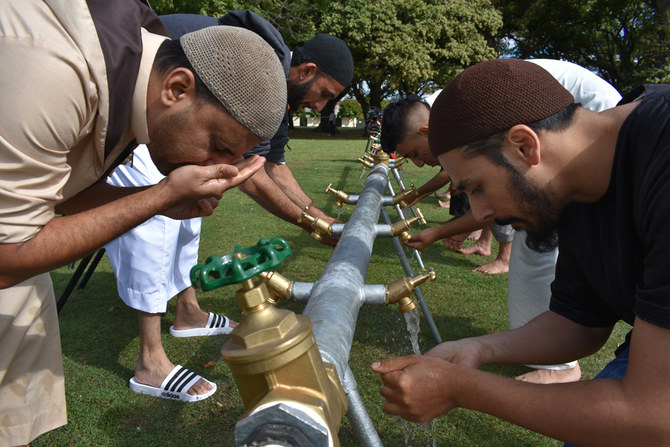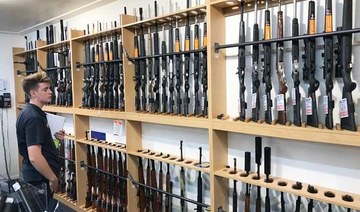CHRISTCHURCH: New Zealanders on Friday marked one week since a mass shooting killed 50 Muslim worshippers in the South Island city of Christchurch, holding nationwide prayers and wearing headscarves to show their support for the devastated community.
People have started congregating at Hagley Park, across the road from Al Noor mosque, where 42 people were killed last week in one of two shootings at mosques on March 15. At least seven others at the nearby Linwood mosque after a white supremacist gunned them down.
Prime Minister Jacinda Ardern will lead thousands of mourners at the park.
The prime minister is expected to be accompanied in the Christchurch prayers with community leaders and other foreign dignitaries.
Thousands more were planning to listen in on the radio or watch on television as the event was broadcast live.
The adhan, or Muslim call to prayer, will be broadcast on all major New Zealand networks at 1:30 p.m. (NZ time), followed by a two-minute nationwide silence.
Fahim Imam, 33, of Auckland, flew in Friday morning from New Zealand’s largest city for the service. He was born and grew up in Christchurch but moved away three years ago.
“It’s just amazing to see how the country and the community have come together — blows my mind, actually,” Imam said before the event.
“As soon as I got off the plane, I saw a sign someone was holding that said ‘jenaza,’ denoting Muslim funeral prayer. Others were offering free rides to and from the prayer service,” Imam said.
“The moment I landed in Christchurch, I could feel the love here. I’ve never felt more proud to be a Muslim, or a Kiwi for that matter. It makes me really happy to be able to say that I’m a New Zealander,” he added.
He called it surreal to see the mosque where he used to pray surrounded by flowers.
Most victims of New Zealand’s worst mass shooting were migrants or refugees from countries such as Pakistan, India, Malaysia, Indonesia, Turkey, Somalia, Afghanistan and Bangladesh.
Muslims account for just over one percent of New Zealand’s population, most of whom were born overseas.
High-powered guns banned
The observance comes the day after the government announced a ban on “military-style” semi-automatic firearms and high-capacity magazines like the weapons that were used in last Friday’s attacks.
There are nearly 250,000 licensed gun owners in New Zealand, which has a population of 5 million. Officials estimate there are 1.5 million guns in the country.
Ardern said people could hand over their prohibited guns under an amnesty while officials develop a formal buyback scheme, which could cost up to 200 million New Zealand dollars ($140 million).
The government said the police and military would be exempt. Access for international shooting competitions would also be considered.
Headscarves
The #headscarfforharmony movement, launched by an Auckland doctor, encouraged people to wear headscarves on Friday to show their support for the Muslim community.
Robyn Molony, 65, was with a group of friend wearing headscarves at Hagley Park, where they walked daily.
“We are wearing headscarves showing our support, love and solidarity, and hope that by everybody doing this it will demonstrate to Muslim women ... that they are one with us,” she said.
Images of a grieving Ardern wearing a black headscarf as she visited families of the victims a day after the attacks were broadcast around the world.
Some women in the capital Wellington were also seen wearing headscarves on their morning commute.
Security high
Armed police have been guarding mosques around New Zealand since the attacks and police said there would be a “heightened presence” on Friday to reassure those attending weekly prayers.
Officers dotted around Christchurch wore green ribbons pinned to their chests as a sign of peace and solidarity. Australian Brenton Tarrant, 28, a suspected white supremacist who was living in Dunedin, on New Zealand’s South Island, has been charged with murder following the attack.
He was remanded without a plea and is due back in court on April 5, when police said he was likely to face more charges.
Newspapers across the country ran full-page memorials with the names of the victims, and a call for national mourning.
“A call to prayer...in unity there is strength,” New Zealand Herald said on its front page.
Candlelight vigils continued until late on Thursday across the country, while volunteers prepared the bodies of the deceased for a mass burial that expected after the prayers.
“All the bodies are washed. We finished around 1.30 a.m. this morning. It was our duty. After we finished there was a lot of emotion, people were crying and hugging,” said a body washer in Christchurch who gave his name as Missouri.
(With Reuters and AP)






























